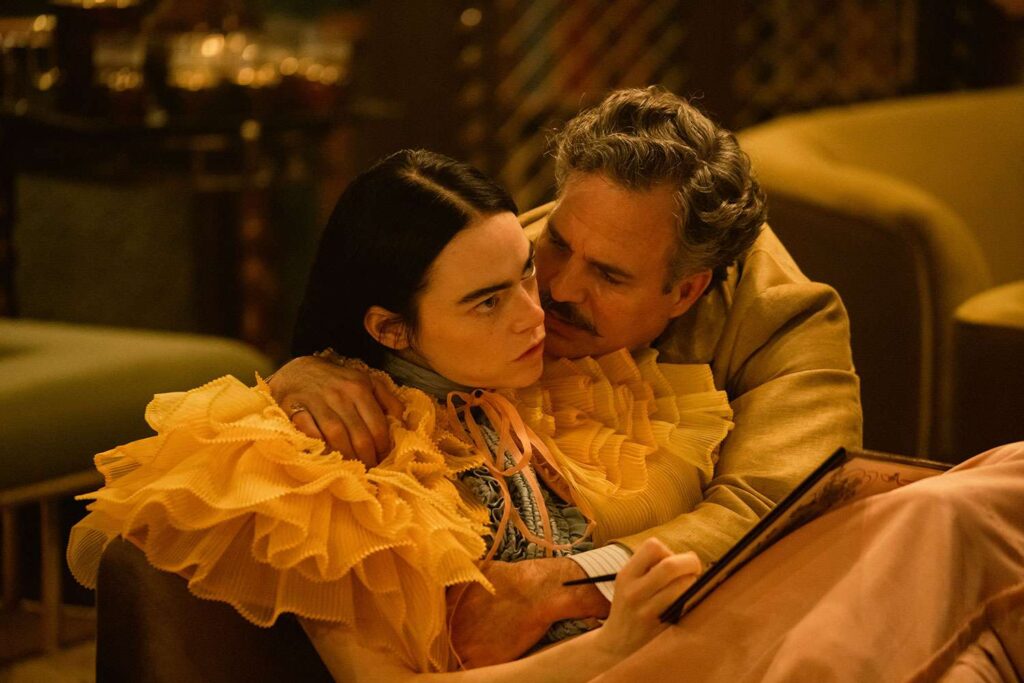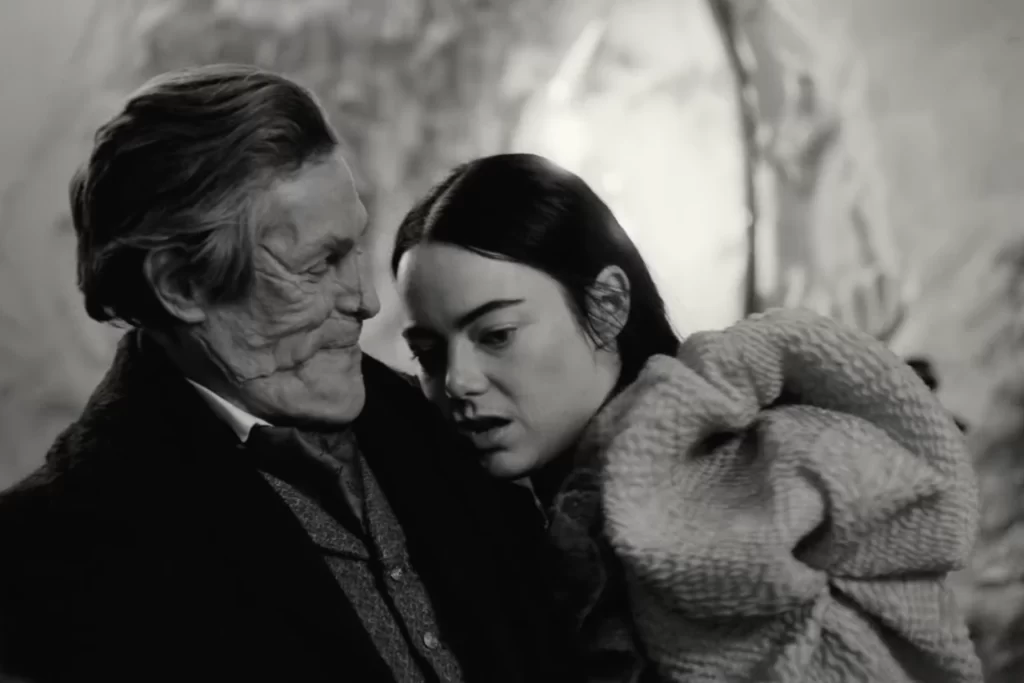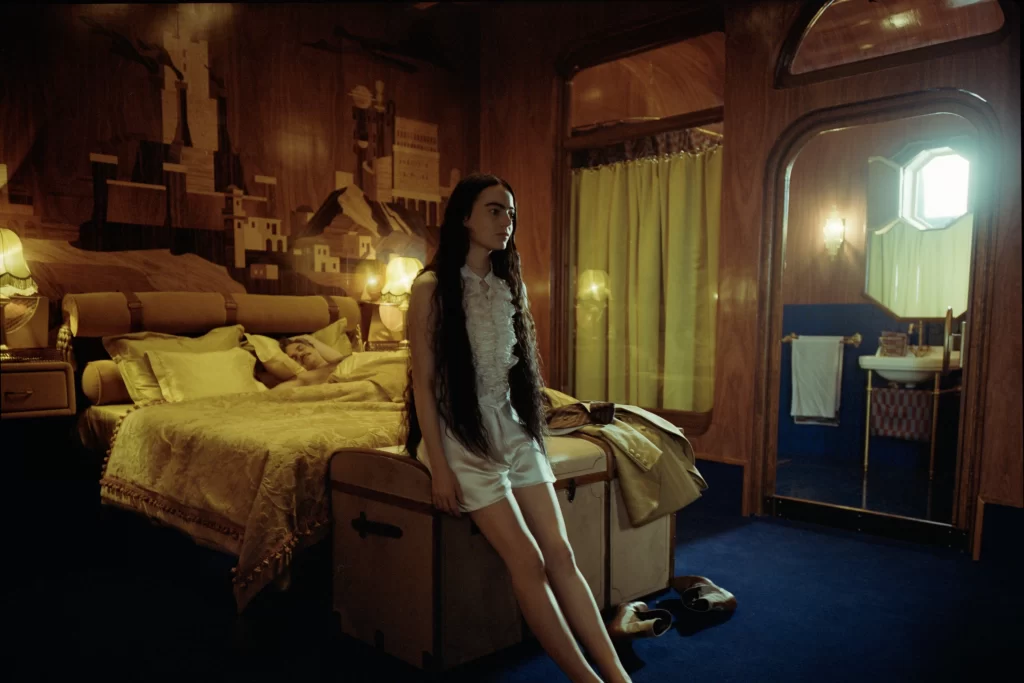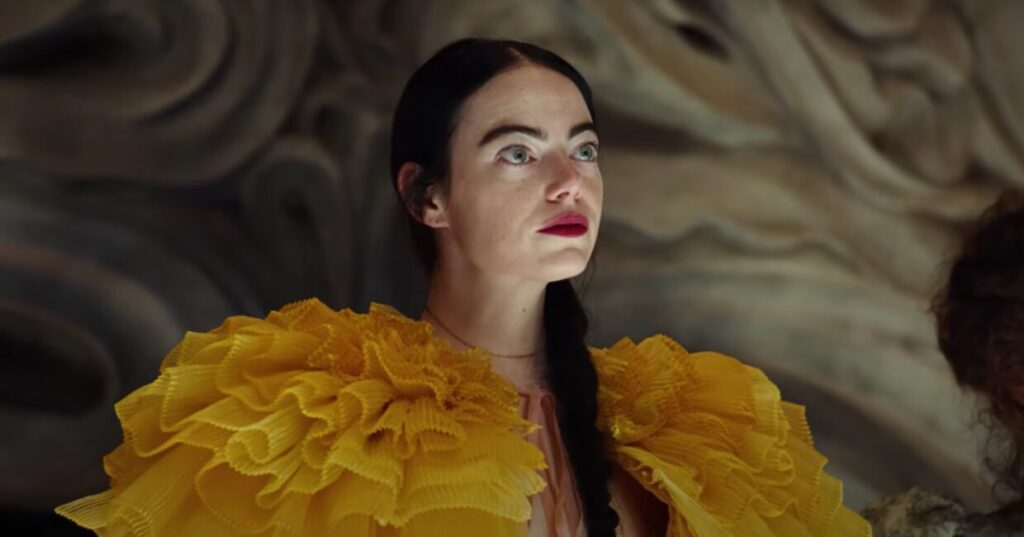
Poor Things opens at a stately manor in Victorian London, where chickens bark, pigs quack, and legless horses draw steam-powered carriages. These hybridized bastardizations are the work of Dr. Godwin Baxter (Willem Dafoe), a brilliant surgeon with scars on his face and curiosity in his heart. When he isn’t tutoring pompous medical students or belching out his farts through a contraption that turns gas into floating spheres, God (as he prefers to be called) toils in his vast private laboratory, concocting unholy experiments in his ongoing quest to investigate and bend the laws of nature. God wields his scalpel with such rigorous dispassion—a blend of mighty intelligence and clinical precision—that you might be tempted to perceive him as a proxy for Yorgos Lanthimos, the movie’s director and cinema’s preeminent scholar of human oddity. But that reading disserves Poor Things, which finds Lanthimos applying his craft with generosity as well as exactitude. God’s creations are perverse; Lanthimos has manufactured a miracle.
In doing so, he has sacrificed none of his talent for arresting imagery (not to mention caustic comedy). From its very first shot—that of a pregnant woman in a blue dress on a bridge, flinging herself to the icy waters below—Poor Things routinely marries the ghastly and the gorgeous. The production design, by Shona Heath and James Price, concocts environments of terrible wonder, like the airborne trams that slice through a smoggy metropolis or the yellow Escheresque staircase that crumbles in midair. (Even the black-and-white title cards that divide the picture into discrete chapters ripple with dazzling eccentricity.) The costumes, by Holly Waddington, are a resplendent array of gowns and bodices, despite every male character wanting to tear them to shreds. And the cinematographer Robbie Ryan, who also shot Lanthimos’ The Favourite, features bursts of bold color yet repeatedly contorts the frame into his singular fisheye style; at times he even shrinks the canvas to a small circle, as though we’re squinting through a peephole at all of the movie’s beautiful grotesqueries.

Chief among those is Bella (Emma Stone), God’s most ambitious and disturbing creation. As explained early on (the screenplay is by Tony McNamara, adapting Alasdair Gray’s novel), God found Bella’s comatose body on the beach and, in a procedure as scientifically impressive as it was ethically dubious, he transplanted the brain of her unborn infant into her adult skull. The result of this inversion of the Frankenstein myth (the doctor is misshapen, the creature flawless) is a physically grown woman who behaves with the inanity of a toddler. Or as one visitor puts it: “What a pretty retard!”
The opening act of Poor Things feints toward operating as a kitschy disability movie. Stone, an actor rarely known for gestural bravado, hurls herself into the childish aspects of Bella’s condition—the garbled words, the lurching movements, the general incomprehension—with an enthusiasm that encroaches on the boundaries of good taste. But even if Lanthimos were concerned with cinematic propriety (and he very much is not), he is not making a conventional document of arrested development. Quite the opposite: As God explains to Max McCandles (Ramy Youssef), the promising pupil whom he hires to record Bella’s behavior and who soon becomes her helpless suitor, her mental acuity is likely to experience accelerated growth.
The same might be said of Poor Things, which becomes exponentially more exciting and thought-provoking as Bella’s brain catches up with her body. This isn’t purely a matter of highfalutin intellect; among its other genres, the movie is an uproarious sex comedy, as when Bella discovers the pleasurable facilities of a cucumber and happily spreads her newfound knowledge along with her legs. (Cue the maid yelping, “She grabbed my hairy business!”; later, Bella coins a fabulous synonym for sex—“furious jumping.”) Yet it is also something of a romantic melodrama. Max, hired to be a passive observer, cannot resist Bella’s guileless charm, even as he frets about the indecency of their potential union. Such thoughtfulness doesn’t afflict Duncan Wedderburn (Mark Ruffalo), the caddish lawyer who plays the alpha male to Max’s beta. Retained by God to hammer out the finer points of Max and Bella’s marriage contract, Duncan instead claims Bella for himself and promptly whisks her away to Lisbon, at which point the movie’s crisp black-and-white aesthetic blooms into full living color, and its plot receives a corresponding jolt of electricity.

Poor Things is enjoyable throughout, but it is never more satisfying than during Bella and Duncan’s sojourn in Portugal, where it chronicles their shifting relationship with sharp humor and withering honesty. Initially, Duncan positions himself as the shameless lothario, seducing Bella with his experience (“Why do people not just do this all the time?” she asks after one ecstatic bedroom romp) and warning her not to fall in love with him. Yet before long, the tables turn; Bella’s mushrooming appetite for life grows beyond Duncan, whose confident cockiness is replaced by infantile jealousy.
“You are losing your adorable way of speaking,” Duncan chides Bella at one point. Beyond a feeble assertion of his possessory interests (Bella is easier to control when she is an invalid), that line represents one of many instances in which Duncan is decidedly wrong. Having not read the novel, I can’t say whether Gray or McNamara is primarily responsible for the dialogue on screen; what I can say is that the script is a linguistic feast, replete with acid quips and cutting rejoinders. Lanthimos’ characters tend to speak in an unnervingly chilly staccato, but here the words flow beautifully, mingling the elegant and the profane. (Facing a stream of vulgar insults, Bella observes to Duncan that “this conversation has grown circular,” to which he pathetically howls, “Cunt!”)

The actors breathing life into these words are all splendid. It has been some years since Ruffalo has received the opportunity to play such a disreputable figure, and he tears into the role with the relish of a man who’s spent far too long wearing mo-cap equipment in front of green screens. Yet while the supporting cast is very good—in addition to fine turns from Dafoe and Youssef (a comedian who’s quite natural in a dramatic role), Kathryn Hunter is excellent as a pragmatic madam—the movie belongs to Stone. With her wide eyes and light English accent, she is an able comedienne, whether she’s vowing to punch a crying baby or responding to a woman’s innuendo with exquisite bluntness (“Oh, you mean his penis”). Yet in dramatizing Bella’s maturation, Stone more broadly articulates an inner hunger—a yearning not just for sex and food and pleasure, but for a more ineffable understanding of the world.
Poor Things is visually sumptuous and verbally sparkling, but the scale of its achievement surpasses its grandeur and acerbity. Narratively it is picaresque—Bella’s tour of Europe brings her from Lisbon to the Mediterranean and then to Paris, where she enlists in society’s oldest profession—but thematically it is ascendant, acquiring genuine insight into human behavior. Bella’s interactions with new people, including a self-described cynic (Jerrod Carmichael) and a politically motivated sex worker (Suzy Bemba), inform her appreciation of philosophy and economics, nudging her prior hedonism into a more complex desire that is noble and defiant. “We are our own means of production,” she declares to a belittling catcaller, a line that reveals not only her rapidly expanding intellect but also the value she places on her most precious commodity: independence.

For his part, Lanthimos’ individuality has never been in question; ever since the fascinating whatsit of Dogtooth, he has maintained his own inimitable combination of razor-sharp technique and absurdist storytelling. With due respect for the excellence of his recent works—the sly dystopian romance of The Lobster, the chilling metaphorical terror of The Killing of a Sacred Deer, the mournful palace intrigue of The Favourite—Poor Things represents the apotheosis of his grand and demented vision. And ultimately, it achieves its majesty not just through its striking images and witty wordplay, but through its startling application of tenderness.
Bella’s journey of liberation may begin as a single-minded quest for understanding, but it steadily evolves into a more enduring search for happiness. Lanthimos’ message isn’t as trite as “love conquers all”—he remains allergic to easy sentimentality—but he nonetheless graces the picture with moving displays of affection: filial, marital, fraternal. Even as it playfully roasts the simpering niceties of polite society, Poor Things acknowledges the importance of human connection.
And also of self-discovery. “I am never happier than when I am in here,” Bella proclaims late in the film, recognition and contentment beaming from Stone’s face. She’s speaking of God’s large operating theater, but she could equally be referring to a different sort of auditorium. We always hear about the impending death of cinema, which makes Poor Things more than a triumph; it’s a resurrection. God may be a fearsomely gifted inventor, but he’s got nothing on the movies.
Grade: A
Jeremy Beck is the editor-in-chief of MovieManifesto. He watches more movies and television than he probably should.
